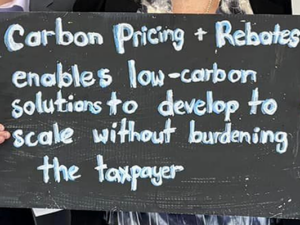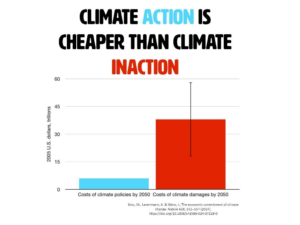CCL Canada focuses on pollution pricing with rebates because it is widely considered to be the most efficient and least costly way to reduce emissions. That being said, at the end of the day, we are not attached to any one policy, but rather, we are attached to having a livable planet. We are open to effective solutions that are supported by consensus data. As of yet, it’s as simple as this: we have not been shown a better solution. The Economist: Impacts of Carbon Pricing in the EU They state that carbon pricing will cover the lion’s share of the EU’s envisioned 90% emissions reduction for 2040, provided that “politicians have the courage to avoid interfering if higher carbon prices become painful for consumers and industry.” 1: Carbon emissions are dropping—fast—in Europe, Thanks to a price mechanism that actually works. The Economist (April 25, 2024) IPCC Data Implementing carbon pricing enables low-carbon solutions, like heat pumps, electric vehicles, geothermal energy, renewables, and many more — to develop and scale across the world. However, the report underlines that “while the coverage of emissions trading and carbon taxes has risen, both coverage and price are lower than is needed for deep reductions”. 2 1: IPCC. 2022. AR6 WG3 Chapter 13 Section 13.6.3.3 : Evaluation of Carbon Pricing Experience Further, an additional euro per tonne of CO2 is associated with a reduction in the subsequent annual emissions growth rate of approximately 0.3 percentage points, all else equal. Source: Carbon Pricing Efficacy: Cross-Country Evidence (2020) Pembina Study on Carbon Tax in B.C. “Looking economy-wide, recent analysis shows per capita fossil fuel use declined by 16.1 per cent in B.C. from 2008 through 2013. The same metric has risen by over three per cent in the rest of Canada. During this same period, B.C.’s per capita GDP has slightly outpaced the rest of Canada’s, growing by 1.75 per cent versus 1.28 per cent.” 1: lessons-bc-carbon-tax-112014.pdf (pembina.org) Independent Assessment of Canadian Climate Policies Risk of Debt Crisis 1: IMF warns of climate-linked debt crisis | IFR (ifre.com) Expert Endorsements 1: Economists’ Statement on Carbon Pricing – EAERE Economist Dr. David Robinson Join our conference in June and you can ask detailed questions about carbon pricing to Dr. Robinson, Dr. Ragan, and others. Laser Talk: Carbon Pricing Works
Major meta-study finds carbon pricing works
A meta-analysis published in May 2024 provides robust evidence that carbon pricing effectively reduces greenhouse gas emissions by 5-21% in the early years of implementation. Analyzing 21 policies, it found significant reductions across various schemes, contradicting previous reviews with unclear methodologies. The effectiveness varies by policy design and context, rather than price level. The study emphasizes the need for more high-quality research, particularly on long-term and high-price schemes, to better understand policy impacts and optimize climate strategies.
1: Systematic review and meta-analysis of ex-post evaluations on the effectiveness of carbon pricing Niklas Döbbeling-Hildebrandt et al Nature Communications (May 16, 2024)
2: Carbon Pricing Works, major meta-study Physics.org (May 16, 2024)
In a April 2024 (1) article from The Economist, the European Unions’ carbon pricing policy was lauded as its “biggest climate achievement” due to the fact that sectors covered by this emissions pricing scheme have jointly reduced emissions by 47% compared to when the scheme was first launched.
The AR6 IPCC reports acknowledges carbon pricing as an effective lever to reduce emissions: “There is abundant evidence that carbon pricing policies reduce emissions.” 1
2: IPCC. 2022. AR6 WG3 Chapter 13: SPM. https://www.ipcc.ch/report/ar6/wg3/downloads/report/IPCC_AR6_WGIII_Chapter13.pdf
30 Year Longitudinal Data
Using data from 142 countries over two decades, researchers found that the average annual growth rate of CO2 emissions from fuel combustion in countries with a carbon price to be 2 percentage points lower compared to countries without a carbon price.
In an independent study (1) from the Pembina Institute, it was found that B.C.’s provincial carbon tax had the following impact on emissions within the province:
The Climate Institute, in their analysis of Canada’s current climate policies (1) found that with the maintenance of the carbon price in large-emitter programs and with the implementation of policy for heavy transport and buildings, it would be enough to “put Canada on a path for net emissions of 482 MtCO2e in 2030, or a 34 per cent reduction below 2005 levels.“
The International Monetary Fund (IMF) warned (1) in October 2023 that relying solely on subsidies to transform our energy systems could increase debt relative to GDP, potentially leading to a debt crisis.
The pollution fees with rebates approach has garnered widespread support from thousands of professional economists (1) worldwide, including 28 Nobel laureates (2) and over 400 Canadian Economists (3), who recognize the efficacy of carbon pricing in driving emissions reductions.
2: Economists’ Statement on Carbon Dividends Organized by the Climate Leadership Council
3: An Open Letter from Economists on Canadian Carbon Pricing | Ecofiscal
Dr. David Robinson said this about fossil fuel pollution pricing with rebates, “It is actually the best scheme in the world anyone has come up with.”
Economist Dr. Chris Ragan
Dr, Chris Ragan recently said this, “The carbon tax and rebate is, in my view and the view of the 425 economists who have signed that open letter, not just *a* way to reduce greenhouse gas emissions in Canada, but it is the *lowest cost* way.”
Critics are right – but…
Some critics say that carbon pricing is not necessary for hitting our climate targets, and they are right. Canada could abandon carbon pricing and still hit our climate targets by using other types of regulations and subsidies—but it would be much more costly to do so. To truly know if there is a better option, we must be shown the costs and GHGs reductions of alternative plans. Otherwise, it is not a true solution. We need solid data.
Laser Talk: Carbon Pricing Works
Home » CCL Canada News » Laser Talk: Carbon Pricing Works





